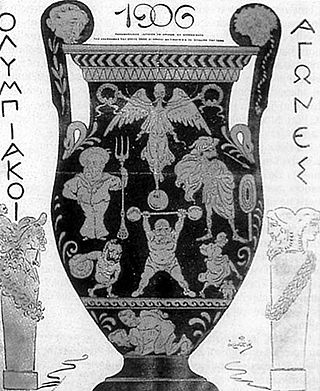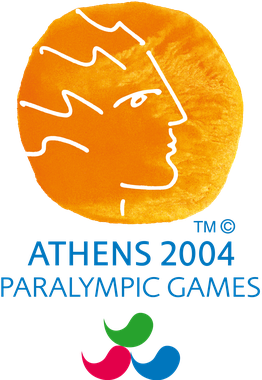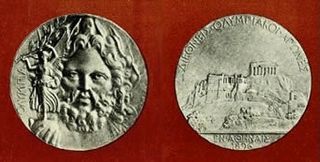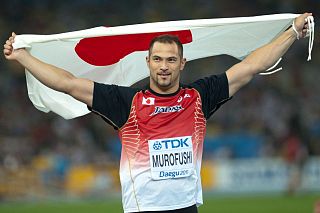
The Summer Olympic Games, also known as the Games of the Olympiad, and often referred to as the Summer Olympics, is a major international multi-sport event normally held once every four years on leap years. The inaugural Games took place in 1896 in Athens, Greece, and the most recent Games were held in 2021 in Tokyo, Japan. The International Olympic Committee (IOC) is responsible for organising the Games and for overseeing the host city's preparations. The tradition of awarding medals began in 1904; in each Olympic event, gold medals are awarded for first place, silver medals for second place, and bronze medals for third place. The Winter Olympic Games were created out of the success of the Summer Olympic Games, which are regarded as the largest and most prestigious multi-sport international event in the world.

The 1896 Summer Olympics, officially known as the Games of the I Olympiad and commonly known as Athens 1896, was the first international Olympic Games held in modern history. Organised by the International Olympic Committee (IOC), which had been created by French aristocrat Pierre de Coubertin, it was held in Athens, Greece, from 6 to 15 April 1896.
At the 1896 Summer Olympics, two tennis events were contested, both for men. They began on 8 April and continued on 9 April, 10 April, and 11 April. 13 or 15 competitors from six nations, including seven Greeks, took part in the tennis competition. Many of the doubles teams were of mixed nationality, including all three medalist pairs. None of the leading players of the time such as Wimbledon champion Harold Mahony, U.S champion Robert Wrenn, William Larned or Wilfred Baddeley participated. To strengthen the field, the organization added sportsmen from other Olympic events, including weightlifter Momčilo Tapavica, hammer thrower George S. Robertson and 800-metres runners Edwin Flack and Friedrich Traun.

At the 1896 Summer Olympics, the first modern Olympiad, twelve athletics events were contested. A total of 25 medals were awarded. The medals were later denoted as 37 modern medals. All of the events except the marathon were held in the Panathinaiko Stadium, which was also the finish for the marathon. Events were held on 6 April, 7 April, 9 April, and 10 April 1896. Altogether, 63 athletes, all men, from nine nations competed. This made athletics the most international of the nine sports at the 1896 Games.

The 2004 Summer Olympics, officially the Games of the XXVIII Olympiad and also known as Athens 2004, were an international multi-sport event held from 13 to 29 August 2004 in Athens, Greece. The Games saw 10,625 athletes compete, some 600 more than expected, accompanied by 5,501 team officials from 201 countries, with 301 medal events in 28 different sports. The 2004 Games marked the first time since the 1996 Summer Olympics that all countries with a National Olympic Committee were in attendance, and also marked the first time Athens hosted the Games since their first modern incarnation in 1896 as well as the return of the Olympic games to its birthplace. Athens became one of only four cities at the time to have hosted the Summer Olympic Games on two occasions. A new medal obverse was introduced at these Games, replacing the design by Giuseppe Cassioli that had been used since 1928. The new design features the Panathenaic Stadium in Athens rectifying the long-running mistake of using a depiction of the Roman Colosseum rather than a Greek venue. The 2004 Games was the first of two consecutive Olympic games to be held in Southern Europe since the 1992 Summer Olympics in Barcelona, Spain, and was followed by the 2006 Winter Olympics in Turin, Italy.

The 1906 Intercalated Games or 1906 Olympic Games was an international multi-sport event that was celebrated in Athens, Greece. They were at the time considered to be Olympic Games and were referred to as the "Second International Olympic Games in Athens" by the International Olympic Committee. However, the medals that were distributed to the participants during these games are not officially recognised by the Olympic Committee and are not displayed with the collection of Olympic medals at the Olympic Museum in Lausanne, Switzerland.

The 2004 Summer Paralympics, the 12th Summer Paralympic Games, were a major international multi-sport event for athletes with disabilities governed by the International Paralympic Committee, held in Athens, Greece from 17 to 28 September 2004. 3,808 athletes from 136 countries participated. During these games 304 World Records were broken with 448 Paralympic Games Records being broken across 19 different sports. 8,863 volunteers worked along the Organizing Committee.

An Olympic medal is awarded to successful competitors at one of the Olympic Games. There are three classes of medal to be won: gold, silver, and bronze, awarded to first, second, and third place, respectively. The granting of awards is laid out in detail in the Olympic protocols.

The 2004 Summer Olympics, officially known as the Games of the XXVIII Olympiad, were a summer multi-sport event held in Athens, the capital city of Greece, from 13 to 29 August 2004. A total of 10,625 athletes from 201 countries represented by National Olympic Committees participated in these games, competing in 301 events in 28 sports. Kiribati and Timor Leste competed for the first time in these Olympic Games.

The men's hammer throw competition at the 2004 Summer Olympics in Athens was held at the Olympic Stadium on 20–22 August. There were 35 competitors from 24 nations. After a series of doping-related disqualifications, the event was won by Koji Murofushi of Japan, the nation's first medal in the event. All distances are given in metres.
The 1980 Summer Olympics, officially known as the Games of the XXII Olympiad, were an international multi-sport event held in Moscow, Russian SFSR, Soviet Union from 19 July to 3 August. A total of 5,179 athletes representing 80 National Olympic Committees (NOCs) participated in 203 events in 22 sports. They were the first Games to be staged in a communist nation.

The 1904 Summer Olympics were held in St. Louis, Missouri, United States from July 1 to November 23, 1904, as part of the St. Louis World's Fair.
The 1900 Summer Olympics were held in Paris, France, from May 14 to October 28, 1900, as part of the 1900 World's Fair.

Athletes from Belarus began their Olympic participation at the 1952 Summer Games in Helsinki, Finland, as part of the Soviet Union. After the Soviet Union disbanded in 1991, Belarus, along with four of the other fourteen former Soviet republics, competed in the 1992 Winter Olympics as the Unified Team. Later in 1992, Belarus joined eleven republics to compete as the Unified Team at the Summer Games in Barcelona, Spain. Two years later, Belarus competed for the first time as an independent nation in the 1994 Winter Olympics, held in Lillehammer, Norway.

Australia competed at the 1896 Summer Olympics in Athens, Greece, from 6 to 15 April 1896. One athlete from Victoria, a British colony which later formed part of Australia, competed at the 1896 Summer Olympics in Athens, Greece. Edwin Flack was born in England and was resident in London in 1896, but spent most of his life in Australia and so is considered an Australian athlete by the International Olympic Committee.

Sweden first participated at the Olympic Games at the inaugural 1896 Games, and has sent athletes to compete in every Games since then with one exception, the sparsely attended 1904 Summer Olympics. Sweden has earned medals at all Olympic games except for two, the 1896 Games and the 1904 Games. The only other nation having earned medals at every Olympic game since 1908 is Sweden's neighboring country Finland.

Greece has a long presence at the Olympic Games, as they have competed at every Summer Olympic Games, one of only five countries to have done so, and most of the Winter Olympic Games. Greece has hosted the Games twice, both in Athens. As the home of the Ancient Olympic Games it was a natural choice as host nation for the revival of the modern Olympic Games in 1896, while Greece has also hosted the 2004 Summer Olympics. During the parade of nations at the opening ceremony of the Olympic Games, Greece always enters the stadium first and leads the parade to honor its status as the birthplace of the Olympics, with the notable exception of 2004 when Greece entered last as the host nation. Before the Games the Olympic Flame is lit in Olympia, the site of the Ancient Olympic Games, in a ceremony that reflects ancient Greek rituals and initiates the Olympic torch relay. The flag of Greece is always hoisted in the closing ceremony, along with the flags of the current and the next host country.

Canada has competed at 28 Summer Olympic Games, missing only the inaugural 1896 Summer Olympics and the boycotted 1980 Summer Olympics. This count includes the 1906 Olympic Games, deemed unofficial 43 years after they were held. The nation made its debut at the 1900 Summer Olympics. Canada competes under the IOC country code CAN.

The all-time medal table for all Olympic Games from 1896 to 2022, including Summer Olympic Games, Winter Olympic Games, and a combined total of both, is tabulated below. These Olympic medal counts do not include the 1906 Intercalated Games which are no longer recognized by the International Olympic Committee (IOC) as official Games. The IOC itself does not publish all-time tables, and publishes unofficial tables only per single Games. This table was thus compiled by adding up single entries from the IOC database.
















